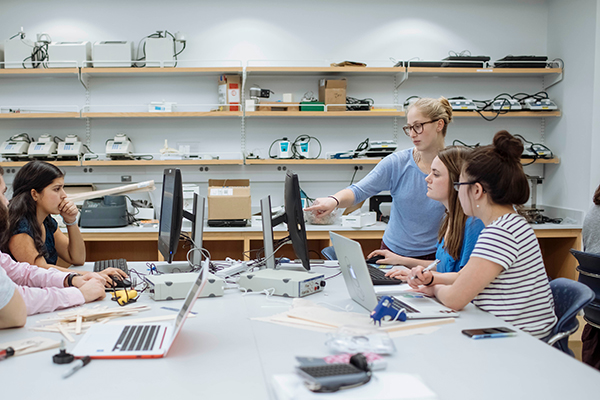It's easy to start your application.
Undergraduate Programs
BS in Biomedical Engineering

The Department of Biomedical Engineering at the McKelvey School of Engineering offers a four-year curriculum leading to a professional baccalaureate degree, a Bachelor of Science in Biomedical Engineering (BS).
Program Educational Objectives
Our overall objective is to prepare those receiving a bachelor's degree in biomedical engineering for a variety of career paths. To that end, our undergraduate curriculum is designed to provide technical proficiency, and other professional skills so that our graduates will be able to:
- Pursue careers in the biomedical engineering industry or related fields.
- Undertake advanced study (e.g., MS, PhD) in biomedical engineering or a related field.
- Complete professional degrees (e.g., in medicine, dentistry, law).
In the first two years, you will build a foundation in mathematics, physics, chemistry, biology and traditional engineering disciplines. In your later years, you will integrate these foundational studies to create models of physiological processes and develop technologies to interact with biological systems. Finally, you will tailor your training with high-level elective courses that will allow you to specialize in areas of interest to you. You'll meet all these goals through hard work, planning and open communication with professors and academic advisers. The BS in Biomedical Engineering is accredited by the Engineering Accreditation Commission of ABET.
Student Outcomes
Student outcomes describe what students are expected to know and be able to do by the time of graduation. These relate to the skills, knowledge and behaviors that students acquire as they progress through the program.
The student outcomes are:
- an ability to identify, formulate, and solve complex engineering problems by applying principles of engineering, science, and mathematics
- an ability to apply engineering design to produce solutions that meet specified needs with consideration of public health, safety, and welfare, as well as global, cultural, social, environmental, and economic factors
- an ability to communicate effectively with a range of audiences
- an ability to recognize ethical and professional responsibilities in engineering situations and make informed judgments, which must consider the impact of engineering solutions in global, economic, environmental, and societal contexts
- an ability to function effectively on a team whose members together provide leadership, create a collaborative and inclusive environment, establish goals, plan tasks, and meet objectives
- an ability to develop and conduct appropriate experimentation, analyze and interpret data, and use engineering judgment to draw conclusions
- an ability to acquire and apply new knowledge as needed, using appropriate learning strategies
Bachelor's/Master's Program in Engineering
This program allows current BME undergraduate students to earn a master's degree with only one additional year of study. Interested engineering students should discuss the program with their adviser by the end of their junior year in order to best develop a plan for their senior year leading into their master's year. With adviser and departmental approval, up to six graduate-level units can be shared between the BS and MS degrees; however, the combined program still requires students to complete a minimum of 150 units in total.
Premedical Preparation
Biomedical engineering is also excellent preparation for various professional schools, particularly medical schools. Many students complete their premedical requirements while obtaining their BME degrees. Premedical preparation is not a major, but rather entails fulfilling the requirements needed for entry to medical school. These generally consist of one year of college-level biology, chemistry, mathematics, English and one year of organic chemistry with laboratory. Further information can be obtained by visiting the pre-medicine web page and contacting Ron Laue, the McKelvey School of Engineering health professions advisor, at ron.laue@wustl.edu.
Cooperative Experience
Cooperative experience is available to upper-level students at numerous life science/technology companies both in the St. Louis area and nationwide. This experience is particularly valuable for students wishing to enter industry. Since most companies ask that students spend the equivalent of one semester and a summer, careful scheduling and planning will be needed to complete the degree requirements in eight semesters, unless students enter with sufficient advanced placement credits and/or take summer courses.
Undergraduate Research
We strongly encourage undergraduates to pursue laboratory or industrial research during the school year or summer break. Many Washington University faculty have research openings for students on the Danforth Campus and at the School of Medicine.
ABET
The BS in biomedical engineering program at Washington University in St. Louis is accredited by the Engineering Accreditation Commission of ABET.
Enrollment and graduation data for BS in biomedical engineering are as follows:
| Academic Year | Enrollment (all undergraduate levels) | BS Graduates |
|---|---|---|
| 2018 | 270 | 59 |
| 2019 | 238 | 69 |
| 2020 | 252 | 59 |
| 2021 | 247 | 61 |
| 2022 | 242 | 55 |
| 2023 | 281 | 48 |
